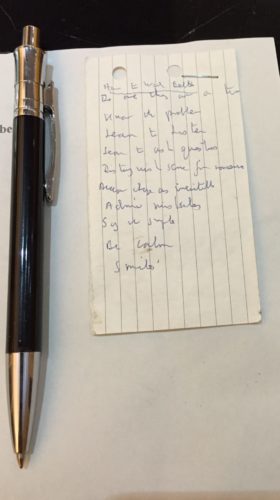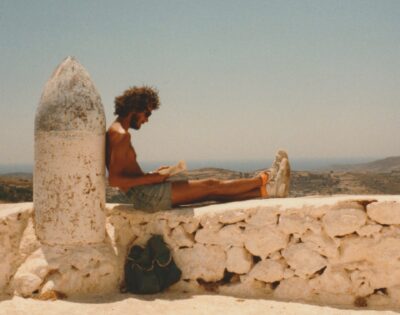How to work better: 10 rules. My father left behind a mystery. What is “How to work better” – and does it matter where it came from?
My father died on 29 November 2013.
He left behind many wonderful memories and made many people’s lives better.
But this blog isn’t about him; I’d need a book for that.
How to work better: 10 rules
This blog is about a list he left written on a tiny scrap of paper:
In his later years my father, a biblio- and logophile, occasionally left the odd piece of paper unfiled or perhaps in a place that was not obviously logical.
So it was my mother, as she sorted through his countless documents, who – rather astonishingly – discovered the scrap of paper; and brought it to my attention recently, thinking I might be interested.
I was fascinated. People love lists.
This one is headed “How to work better” and reads as follows:
- Do one thing at a time
- Know the problem
- Learn to listen
- Learn to ask questions
- Distinguish sense from nonsense
- Accept change as inevitable
- Admit mistakes
- Say it simple (sic)
- Be calm
- Smile
An origin myth
I thought the list intriguing (why “simple”?) and googled it. If you search “How to work better do one thing at a time” you will get pictures like this, showing the text painted on an office building. The list appears on quotation websites. If you google “images” of the same text you will find different versions, many showing the list in red capitals on a white or yellow background.
So where did it come from? The first clue I found was in an academic work about something else entirely, referring to “a text-based wall-painting” produced in 1991 by two Swiss artists, Peter Fischli and David Weiss.
Persuasive but empty sentences?
I found a Guardian obituary of David Weiss, who died in 2012. It said “How to Work Better” was made up of “10 persuasive but empty sentences, each with the aim of improving workplace productivity and morale” and “plucked… from a factory in Thailand.” An exhibition text, published in 2011 to mark a show in Basel, analyses “these new ten commandments” almost to death and recycles the “Thai pottery factory” story.
I could not initially find the photos which Fischli and Weiss are said to have taken of the original slogans in Thailand in 1990. Later, someone sent me a link, reported in my second post on this subject.
Did the artists really see those slogans? Or was there a more prosaic source?
How to work better: 10 rules – Art, or reality?
I like a lot of modern and contemporary art, including, I think, “How to work better”. But the pseudy explanatory notes which often accompany such works in galleries and catalogues are a whole new bogus art form in themselves.
So: my journey has taken in pleasure, at discovering an interesting list in my father’s handwriting; through intrigue, that the list comes from a work of contemporary art; to disappointment, that the list is perhaps designed to be ironic or meaningless.
That disappointment may explain my suspicion about the “Thai factory slogans” story. Would I be happier if it turned out that the artists made the story up? Maybe.
Do I feel uneasy that my much-loved father, who may have written his list before the Internet existed, could have noted in earnest a list designed to be ironic? A bit.
So I turned it round. If the list was helpful to someone, could it become valid in its own right, whatever its origin?
Or, a stage further: if my father found it helpful, or in line with his own evident success in living a fascinating and productive life, does that help validate the list and, perhaps, mean we should pay attention to it?
Discuss.
Thoughts welcome. And if you have an alternative source for origin of the “How to work better” list, or images of the Thai factory in which they are said to have been photographed in 1990, I’d love to hear from you.
P.S. A reader (thank-you, @mrRooBKK) has alerted me to what he suggests is the original Thai version of this legend.
P.P.S. If you enjoy fresh, original writing, please subscribe to my weekly newsletter (you can unsubscribe anytime you wish).








3 Responses
I have a photo of this artwork stuck on my fridge. I like the common sense advice, as well as the way it comments on motivational sloganeering!
Must have been very affecting seeing this written by your father.
As a trainer in mindfulness, I was struck by how many of these precepts underlie a mindful approach. For example, in our age of digital devices, multi-tasking and information overload, how much more effective we would all be if we could train ourselves to do one thing at a time with complete focus and attention. So, notwithstanding dubious origins or ironic intent, I’d say we could usefully reflect on what those simple phrases might mean for us, and act on them.
The 10 rules on how to work better predate 1990, I remember a poster hanging in the house where I lived in Lusaka, Zambia as early as 1971. The source is still a mystery to me, as in that time the internet never existed , so I can only say wherever, the compiled material came from, it must have existed before 1970!